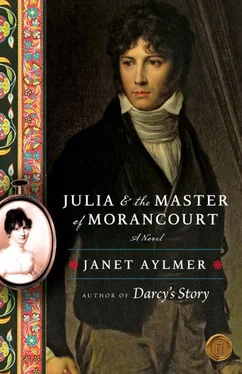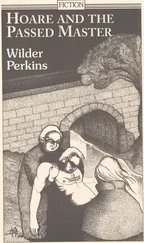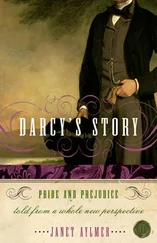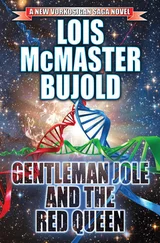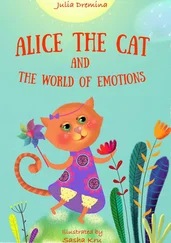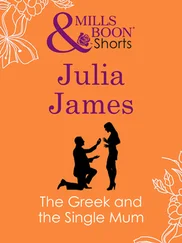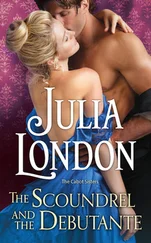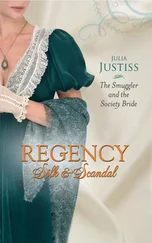Julia was already so upset that this remark put her into a really bad temper and she turned her face away to look fixedly out of the carriage window, and she refused to say anything for the rest of the journey. If she had glanced at her aunt, she would have been even more infuriated to see that Aunt Lucy was smiling to herself.
In his usual jovial way, Harry Douglas was waiting to welcome them at Norton Place by the bottom of the steps leading to the front door. Julia had intended to thrust the package containing La Passerelle into his hands as soon as she arrived, but her aunt’s firm grasp of her arm prevented that. Julia found herself inside the house and walking beside Mr. Douglas along the corridor to the salon without having any option in the matter.
Once they were there, her host said to Aunt Lucy, “Have you said anything to Miss Maitland since yesterday?”
“No, sir,” said her aunt.
Julia looked from the one to the other, mystified.
“You will have heard your mother, Mrs. Maitland, say that she would favour my son marrying her eldest daughter, if your father agreed? I imagine that you were not happy about that?”
She stared at him, then replied, “No sir, I was not—no one seems to think of consulting me about my own future! I wish to return La Passerelle to you now.”
“Indeed. Now, please do as I ask. Take that package into the library, and leave it there if you wish. And when you are ready, come back and join us in the salon here.”
He spoke calmly, and Julia’s wrath was changing now to a dull ache of sadness, and she did not move.
“Julia,” said Aunt Lucy, “please do as Mr. Douglas requests.”
Julia glared at her and at last turned on her heel and walked along the corridor and into the library. She went across the room to the table by the window where she had seen the Book of Hours on her first visit to the house, and put the package down. She looked down and let her hand rest on the book for several moments, remembering that day. She raised her head and was about to turn to leave the room when she jumped in alarm, for there, reflected in the glass of the window, was a tall figure standing in the shadows beside the door, watching her. It was only when she turned to face him that he stepped forward into the light and she realised who it was.
He looked at her gravely. “My father tells me that you are very unlikely to want to marry his son, Miss Maitland. Does that apply to me, or are you willing to make an exception for a gentleman who, as you know, may never be able to waltz very well?”
Julia was at a loss for words. It had been such an emotional few hours since Mr. Douglas had visited Banford Hall to see her father, filled with sadness and fear for the future.
Kit Hatton walked slowly across the library towards her, then stopped just beyond touching distance and said, “I understand that Mr. Maitland and your mother are happy with the proposition that my father put to them yesterday, that you should marry me.”
It was only then that Julia realised what Aunt Lucy had meant in the carriage. Harry Douglas had asked Mama if she would favour his son marrying her eldest daughter. But he had not said which son.
“Come, my darling,” said Kit. “Everything really is all well for us both now.” And he opened his arms to her as she wept tears of joy and relief. She had dreamt so many times of kissing Kit Hatton, but the reality surpassed what she had hoped for, and needed, and wanted.
Eventually they turned their attention to more practical matters. Kit told Julia how Aunt Lucy and Harry Douglas had collaborated together to pass on the news about Dominic Brandon’s marriage, and Kit had set off immediately from Dorset to travel to Norton Place.
“About ten days ago, James Lindsay confronted his cousin Patrick about the connection with Dominic Brandon, and Patrick revealed many details about the distribution network for contraband that Dominic had been organising. Frank Jepson was caught by the revenue men a few days later as he landed with a large cargo of contraband at the bay near Morancourt. I wrote to your aunt, and she passed that information on to Emily Brandon, who told the earl and countess.”
It was quite half an hour later when there was a firm cough in the doorway, and they both turned around to see Harry Douglas and Aunt Lucy standing side by side, regarding them with expressions of amusement and affection.
“Well, my dear,” said her aunt, “are you still going to return La Passerelle to Mr. Douglas?”
“No, Aunt,” said Julia meekly, “for Kit has told me that the book belongs to both of us from now on.”
The History Behind The Story
The term “historical fiction” is usually applied to a novel set in any period between the Dark Ages (before Christ) and the years immediately following the Second World War. The Historical Novel Society was founded in England in 1997, at a time when historical fiction was rather less popular than it is now, by a group of enthusiasts who volunteered to review novels being published on historical subjects.
As a keen reader of historical novels, I joined the Society in its early days, and it has continued to prosper with more and more readers, authors, publishers, and agents from the UK, and more recently from the US, becoming members. Over 100 volunteers now review about 800 books that have been published in the English language each year for the Society. Harper Collins authors like Tasha Alexander, Suzannah Dunn, Nicole Galland, and Robin Maxwell have all pleased readers with their novels about particular times in history.
Although I enjoy reading novels set in all different periods of history, I seem to return most frequently to those often described as Regency Romances, which are set in the early 1800s, a time originally immortalised by the English author Jane Austen, whose six novels remain as popular now as they were in the century when they were written. She surely would have been amazed by the “Jane Austen industry” which has prospered during the past few decades through books, TV series, and films, and in particular the enduring enthusiasm of readers for her most enigmatic hero. My novel Darcy’s Story was written following the considerable success of the BBC TV series based on her bestloved book Pride and Prejudice . More recently, Cassandra & Jane , by Jill Pitkeathley, has delighted Jane Austen’s fans.
At its simplest, a Regency Romance takes place in a “gilded cage,” where a handsome hero and an attractive heroine move through grand stately homes to their destiny, apparently unaffected by the realities of everyday life.
But to me, the Regency period in England was more interesting than that. Sufficiently remote from the present day to be intriguing, and yet recent enough for there to be numerous written records of the changing patterns of life at that time, one can see the beginnings of what came to be known as the industrial revolution, the introduction of more sophisticated financial systems and the beginnings of a more emancipated life for educated women, all set against the backdrop of the war with Napoléon in the early years of the nineteenth century.
So the author of a Regency Romance has a choice. One is to take the simple route in developing the story within a “gilded cage,” and there are very many successful examples of that approach. The other option, and my preference, is to set the novel in a more realistic context, leading the reader through the way the world is changing around the characters as they approach their destiny.
The interaction between the different personalities in a family holds a particular interest for me. In my novel, the middle daughter, Sophie Maitland, took after her mother, Olivia, in being determined and irrepressible, running at everything in life at full-tilt, and could be very thoughtless. Her elder sister, Julia, also inherited her mother’s determination, but otherwise was a much calmer person, like her father, as well as being sympathetic and practical. The ideal “partners in life” for each of the sisters are therefore very different, and their stories are likely to develop accordingly. Where a personality is less clear-cut, as with the youngest sister, Harriet Maitland, there may appear to be more options, although most of her character would already have been formed when she was much younger.
Читать дальше
